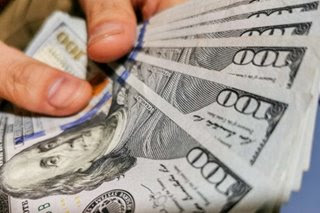LONDON - The dollar edged higher, the euro fell and the yen steadied on Monday as currency markets reversed some of Friday's moves, calming after the initial shock of discovering a new coronavirus variant.
The Omicron variant, first detected in southern Africa, triggered global alarm, with financial markets selling off on Friday on fears that it would disrupt the economic recovery after the two-year pandemic.
The World Health Organization said it was not yet clear whether Omicron, which has been found around the world, is more transmissable than other variants or if it causes more severe disease.
Markets calmed somewhat on Monday, however, with US stock futures and oil prices rebounding, as investors took a more balanced view, waiting until the impact of the variant becomes more clear.
The US dollar index, which had its biggest one-day drop since May on Friday, edged back higher and at 0821 GMT was up 0.1 percent on the day at 96.326.
The dollar's status as a safe-haven currency means it can benefit from uncertainty, but it fell on Friday because the Omicron variant was seen as possibly affecting when the Federal Reserve and other major central banks will raise rates.
The euro, which rose versus the dollar on Friday, was down around 0.4 percent at $1.12665.
Commerzbank's head of FX and commodity research Ulrich Leuchtmann wrote in a client note that the euro had initially benefited from the Omicron variant because of the dovishness of the European Central Bank.
"If Omicron leads to lockdowns and a renewed reduction in economic activity on a global scale all rate hike expectations turn out to be in vain and then they will be priced out again pretty quickly," he said.
"And which currencies will be the relative winners? Of course, the ones where rate hikes were never priced in very much in the first place. And those were EUR, JPY and CHF."
Japan's yen steadied and was up around 0.2 percent on the day versus the dollar at 113.33 at 0829 GMT. Euro-yen hit a new nine-month low.
The Swiss franc likewise reversed recent moves. On Friday it had its biggest one-day jump versus the dollar since June 2016, a slightly bigger daily move than at the peak of the first coronavirus-induced market shock in March 2020, but on Monday it was down 0.4 percent on the day, at 0.9256.
Analysts said that currency markets would likely remain volatile until the new variant is better understood.
"Vaccine efficacy results with the next two weeks will be the most important headline to watch out for as well as whether symptoms are different from that of other variants," wrote Nomura analyst Jordan Rochester in a note to clients.
Goldman Sachs said it would not change its economic forecasts on the basis of the Omicron variant until its likely impact becomes clearer.
BioNTech said on Friday it may know within two weeks if the vaccine it developed with Pfizer needs to be reworked.
Meanwhile, in cryptocurrencies, bitcoin hit a seven-week low on Sunday before picking up. At 0837 GMT, it was at $57,386.24, up around 0.1 percent on the day but still below its latest all-time high of $69,000, which was hit earlier this month.
(Reporting by Elizabeth Howcroft, editing by Ed Osmond)
-reuters












